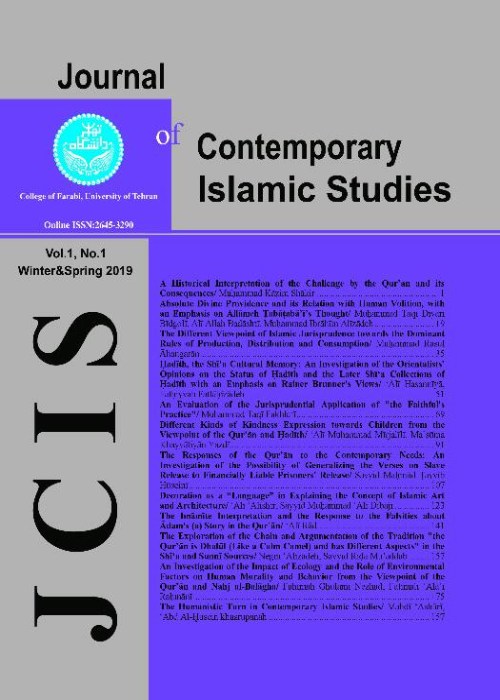Theory of “Ethical Leadership” in the governmental conduct of Imām ‘Alī (a) and the approaches of management: a comparative study of the elements with an emphasis on Nahj al-Balāgha
Author(s):
Article Type:
Research/Original Article (دارای رتبه معتبر)
Abstract:
The theory of “Ethical Leadership” is one of the new notions which earnestly found its way into the management literature at the last decades of the twentieth century. According to this theory, besides the significance of enforcing ethical laws for the society or the organizations, scientists hold the demonstration of ethical behaviors by the leader of the society in the personal and social relations as well as the transfer of these norms to the common people via various ways play the main role in the realization of social ethics and the advancement of sublime goals. Because in Islam it is necessary to know, analyze, and explicate the elements of “ethical leadership,” the present article attempts to investigate the elements of the aforesaid theory in the governmental conduct of Imām Alī (a) with a descriptive-analytical approach. Moreover, for this goal it tries to provide a suitable and evidence-based model which can be analyzed and assessed based on the leadership theories in the knowledge of management. Therefore, the goal of this research is to analyze the elements of this theory and compare them with the approach of Imām Alī (a). To do so, via a narrative approach with the pivotal role of Nahj al-Balāgha, the elements of “ethical leadership” in the talks and behavior of Imām are extracted and analyzed; and with the provision of tangible instances of his life, it is shown these elements can be operational. The obtained results show that the aforesaid elements contain all the personal, ideological, relational, managerial, etc. indexes both in personal and social dimensions and can efficiently act as a model for leading the society. There can be seen, of course, ideological differences in some aspects like in self-control. Thus, despite noticeable similarities, these differences accentuate the discrepancy of this theory with the political and governmental thought and teachings of Imām ‘Alī (a).
Keywords:
Language:
English
Published:
Journal of Contemporary Islamic Studies, Volume:5 Issue: 2, Summer-Autumn 2023
Pages:
159 to 179
magiran.com/p2599986
دانلود و مطالعه متن این مقاله با یکی از روشهای زیر امکان پذیر است:
اشتراک شخصی
با عضویت و پرداخت آنلاین حق اشتراک یکساله به مبلغ 1,390,000ريال میتوانید 70 عنوان مطلب دانلود کنید!
اشتراک سازمانی
به کتابخانه دانشگاه یا محل کار خود پیشنهاد کنید تا اشتراک سازمانی این پایگاه را برای دسترسی نامحدود همه کاربران به متن مطالب تهیه نمایند!
توجه!
- حق عضویت دریافتی صرف حمایت از نشریات عضو و نگهداری، تکمیل و توسعه مگیران میشود.
- پرداخت حق اشتراک و دانلود مقالات اجازه بازنشر آن در سایر رسانههای چاپی و دیجیتال را به کاربر نمیدهد.
In order to view content subscription is required
Personal subscription
Subscribe magiran.com for 70 € euros via PayPal and download 70 articles during a year.
Organization subscription
Please contact us to subscribe your university or library for unlimited access!


